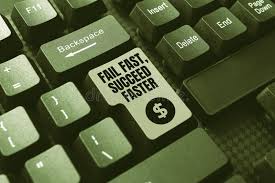Contents
ToggleFailed Attempt is an inevitable part of life. From small personal setbacks to large-scale professional disappointments, everyone experiences failure at some point. While society often glorifies success, the reality is that failure plays a crucial role in growth and self-discovery. Understanding failed attempts not as the end but as a stepping stone can lead to incredible opportunities for learning and personal development.
The Emotional Impact of a Failed Attempt

Experiencing failure often triggers a wide range of emotions, from disappointment and frustration to shame and doubt. These feelings can be overwhelming, making it hard to view the situation objectively. However, acknowledging and processing these emotions is an essential first step in transforming failure into growth. Denying these feelings or letting them fester can lead to a negative cycle of self-doubt, which hinders progress.
Recognizing the Roots of a Failed Attempt
Failed attempts can occur for a variety of reasons. Some common causes include poor planning, lack of resources, external factors beyond one’s control, or even simple misjudgments. Analyzing the root causes of failure is critical to ensure that future efforts are more successful. This requires honest self-reflection and, in some cases, seeking feedback from others to gain a more comprehensive perspective.
Learning from Failed Attempts
Failure is often described as the best teacher. Each setback offers valuable lessons that can pave the way for future success. Some key areas of learning include:
- Improved Planning: Identifying gaps in preparation or execution allows for better strategies moving forward.
- Resilience: Developing the ability to bounce back from failure builds mental toughness and adaptability.
- Innovation: Many breakthroughs in science, art, and technology stem from experiments that initially failed. These attempts reveal what doesn’t work, bringing creators closer to what does.
Examples of Failed Attempts Leading to Success

History is full of examples where failed attempts have ultimately led to groundbreaking success. Thomas Edison, for instance, famously remarked that he didn’t fail but found thousands of ways that didn’t work while inventing the light bulb. Similarly, J.K. Rowling faced numerous rejections before Harry Potter became a global phenomenon.
These stories demonstrate that failure is not an indicator of one’s abilities but rather a necessary step in the journey toward success. They also highlight the importance of persistence, creativity, and a willingness to adapt.
Overcoming the Fear of Failure
Fear of failure often prevents individuals from taking risks or pursuing their goals. This fear can stem from societal expectations, personal insecurities, or past experiences. To overcome this fear, it’s important to reframe how one perceives failure. Viewing failed attempts as opportunities for growth rather than as personal shortcomings can help reduce the stigma surrounding failure.
Building a supportive environment is also crucial. Encouragement from friends, family, or mentors can provide the confidence needed to face challenges head-on. Practicing self-compassion and focusing on effort rather than outcomes can further reduce the fear of failure.
Strategies for Turning Failed Attempts into Success
To transform failure into a positive force, consider the following strategies:
- Reflect and Analyze: Take time to understand what went wrong and why. Identify specific areas for improvement.
- Set Realistic Goals: Unrealistic expectations can set one up for failure. Break larger objectives into manageable steps to create a sense of progress.
- Embrace Adaptability: Be open to changing your approach. Flexibility allows you to pivot when faced with unexpected obstacles.
- Seek Support: Don’t be afraid to ask for help or advice. Collaborating with others can offer fresh perspectives and solutions.
The Role of Resilience in Handling Failed Attempts

Resilience is a critical quality that enables individuals to navigate failure effectively. Resilient people view setbacks as temporary and solvable, maintaining a positive outlook even in yowestogel challenging situations. Building resilience involves cultivating self-confidence, setting boundaries, and maintaining a strong support network.
Practicing mindfulness and stress management techniques can also enhance resilience, allowing individuals to approach failure with a calm and focused mindset. Over time, resilience turns failed attempts into valuable experiences that fuel growth.
The Broader Impact of Failure on Society
Failure is not just a personal experience but also a societal phenomenon. Innovations and advancements often arise from collective efforts that include numerous failed attempts. For example, space exploration is marked by countless setbacks, yet each failure contributes to progress and discovery.
In creative fields, failure is often celebrated as part of the process. Artists, writers, and musicians frequently experiment with ideas that may not succeed initially but eventually lead to groundbreaking work. Recognizing the value of failed attempts fosters a culture of experimentation and learning.
Conclusion
Failed attempts are an integral part of life and should not be viewed as a reflection of one’s worth or potential. Instead, they represent opportunities to grow, adapt, and ultimately achieve greater success. By embracing failure, analyzing its causes, and applying the lessons learned, individuals can transform setbacks into stepping stones for future achievements. Failure, in this sense, is not the end—it is simply a beginning.



